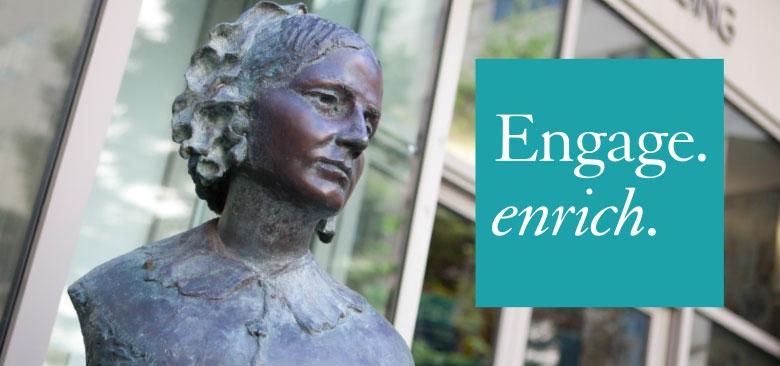
Leadership in Action: Alumni, Faculty, Staff and Student Milestones
New Dean, Leadership Team at UCSF School of Nursing
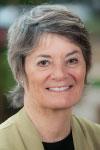 Catherine L. Gilliss Catherine L. Gilliss has been appointed dean of the UC San Francisco School of Nursing, succeeding former dean David Vlahov, who served from 2011 to 2016, and Sandra Weiss, who has served as interim dean since Vlahov’s departure.
Catherine L. Gilliss Catherine L. Gilliss has been appointed dean of the UC San Francisco School of Nursing, succeeding former dean David Vlahov, who served from 2011 to 2016, and Sandra Weiss, who has served as interim dean since Vlahov’s departure.
Gilliss, who earned her PhD degree in nursing from UCSF, served as chair of the School’s Department of Family Health Care Nursing from 1993 to 1998. From 1998 to 2004, she served as dean of the Yale University School of Nursing, then as dean of the Duke University School of Nursing (where she received her BSN degree), stepping down in 2014. She spent the 2014-2015 academic year as a fellow at the Stanford University Distinguished Careers Institute.
Gilliss’s research has focused on chronic illness, particularly the impact of behavior and the role of the family in managing chronic illness. She has also focused on translational and implementation science and innovative models of health care delivery, and served as director of the Duke Translational Nursing Institute, a venture with the Duke University Health System Nursing Service, from 2009 to 2013. Gilliss is currently a director of Chimerix, a publicly traded biotech company dedicated to preventing and treating life-threatening viral infections.
Gilliss will assume her new position on September 25. Her leadership team will include Judy Martin-Holland, associate dean for academic programs and diversity for the past nine years, as well as two new associate deans who were recently appointed after an internal search conducted by Interim Dean Weiss. Catherine Waters was recently named interim associate dean for academic affairs, and Julene Johnson was recently named interim associate dean for research.
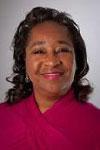 Judy Martin-Holland Prior to assuming her associate dean position in 2008, Martin-Holland was assistant dean of academic services and diversity enhancement, where she oversaw the School’s student recruitment program with an emphasis on increasing diversity of the applicant pool and student admissions.
Judy Martin-Holland Prior to assuming her associate dean position in 2008, Martin-Holland was assistant dean of academic services and diversity enhancement, where she oversaw the School’s student recruitment program with an emphasis on increasing diversity of the applicant pool and student admissions.
She is a graduate of UCSF’s master's, post-master’s and doctoral degree programs, and her leadership in many roles in nursing over the past three decades has garnered recognition from many different groups. Among them: She is a fellow of the American Academy of Nursing, she received a Chapter Leadership Award from the Alpha Eta Chapter of Sigma Theta Tau International, and she received the Chancellor Award for Dr. Martin Luther King, Jr. Leadership from UCSF.
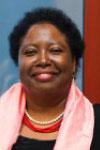 Catherine Waters Waters, a professor of Community Health Systems and the Sally Bates Endowed Chair in Health Disparities, brings extensive leadership experience and understanding of academic policymaking to her new role.
Catherine Waters Waters, a professor of Community Health Systems and the Sally Bates Endowed Chair in Health Disparities, brings extensive leadership experience and understanding of academic policymaking to her new role.
She has served in numerous capacities in the School and across the UCSF campus, including on the Academic Senate and many university-wide committees: the Committee on Academic Personnel, the Graduate Council, the Committee on Courses of Instruction, the Committee on Rules and Jurisdiction, the Committee on Academic Planning and Budget and the Coordinating Committee.
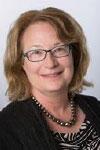 Julene Johnson Johnson, adjunct professor in the Institute for Health & Aging, is a fellow of the Gerontological Society of America and a nationally known investigator in the areas of cognitive aging and dementia risk among diverse racial and ethnic populations. With research funding from federal, state and private organizations, she has conducted research and developed novel community-based interventions to promote the well-being of older adults.
Julene Johnson Johnson, adjunct professor in the Institute for Health & Aging, is a fellow of the Gerontological Society of America and a nationally known investigator in the areas of cognitive aging and dementia risk among diverse racial and ethnic populations. With research funding from federal, state and private organizations, she has conducted research and developed novel community-based interventions to promote the well-being of older adults.
She has also served as a grant reviewer for many international, national and state agencies, including four National Institutes of Health (NIH) institutes, and on the campus Resource Allocation Program (RAP) Neurosciences Review Committee. As a mentor for early-career faculty, postdoctoral fellows and graduate students, she has helped facilitate their development as researchers and helped many achieve and manage important research grants.
Ifeyinwa Asiodu in the New York Times on Breastfeeding Disparities
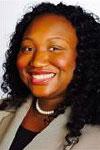 Ifeyinwa Asiodu Ifeyinwa Asiodu, assistant professor of Family Health Care Nursing, was quoted in an August 17 New York Times article on breastfeeding disparities between African American and white mothers.
Ifeyinwa Asiodu Ifeyinwa Asiodu, assistant professor of Family Health Care Nursing, was quoted in an August 17 New York Times article on breastfeeding disparities between African American and white mothers.
Asiodu, whose research focuses on the intersection of race, gender, family dynamics and life course with breastfeeding, is currently investigating the impact of social media on breastfeeding.
In the article, Asiodu emphasized the importance of breastfeeding for potentially mitigating poor outcomes for infants in the African American community, which sees higher rates of prematurity, low birth weight and infant mortality.
Dawson-Rose and Park to Help Guide SFBay Collaborative Research Network
 Carol Dawson-Rose (left) and Linda Park Carol Dawson-Rose and Linda Park, both from the School’s Department of Community Health Systems, were recently appointed to the steering committee of the San Francisco Bay Area Collaborative Research Network (SFBayCRN), a program of UCSF’s Clinical & Translational Science Institute that facilitates primary care practice-based research partnerships between researchers and community-based primary care organizations, practices and clinicians across the San Francisco Bay Area and Northern California.
Carol Dawson-Rose (left) and Linda Park Carol Dawson-Rose and Linda Park, both from the School’s Department of Community Health Systems, were recently appointed to the steering committee of the San Francisco Bay Area Collaborative Research Network (SFBayCRN), a program of UCSF’s Clinical & Translational Science Institute that facilitates primary care practice-based research partnerships between researchers and community-based primary care organizations, practices and clinicians across the San Francisco Bay Area and Northern California.
SFBayCRN offers consultation, training, partnership opportunities and other resources on practice-based research issues to researchers and community partners.
Helen Horvath on Nursing Roles in Home Care in AAHCM Newsletter
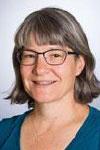 Helen Horvath In an article in the Summer 2017 issue of the American Academy of Home Care Medicine’s Frontiers newsletter, Assistant Professor of Community Health Systems Helen Horvath delves into the myriad roles played by nurses in home care.
Helen Horvath In an article in the Summer 2017 issue of the American Academy of Home Care Medicine’s Frontiers newsletter, Assistant Professor of Community Health Systems Helen Horvath delves into the myriad roles played by nurses in home care.
Horvath outlines in the article the differences in education, training and scope of practice between RNs and LPN/LVNs. She notes that personal experience also contributes to variation in nurses’ abilities, advising readers to ask colleagues about their training and scope of practice, and what they have to contribute to patient care.
Lisa Thompson’s Guatemala Research Featured in National Geographic Photo-Essay
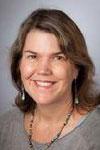 Lisa Thompson In April, Associate Professor of Family Health Care Nursing Lisa Thompson guided National Geographic science writer Michelle Nijhuis and photographer Lynn Johnson through her research site in San Lorenzo, Guatemala, for a recently published photo-essay on the topic of Thompson’s work: household air pollution from solid-fuel cookstoves.
Lisa Thompson In April, Associate Professor of Family Health Care Nursing Lisa Thompson guided National Geographic science writer Michelle Nijhuis and photographer Lynn Johnson through her research site in San Lorenzo, Guatemala, for a recently published photo-essay on the topic of Thompson’s work: household air pollution from solid-fuel cookstoves.
Thompson has conducted several research projects on the health impact of exposure to pollution from cookstoves in developing countries, including Guatemala.
The article notes that Thompson (who has recently joined the faculty of the Nell Hodgson Woodruff School of Nursing at Emory University) is leading an international team of researchers investigating whether an intervention to reduce household air pollution by providing and teaching families to use gas stoves can improve the health of mothers and children.
IMPACT-ICU Project Results: ICU Nurses Better Prepared to Provide Palliative Care
 From left: Kathleen Puntillo, Wendy Anderson, Steven Pantilat The results of a UCSF-led, two-year initiative to train bedside ICU nurses demonstrate that nurses trained through the project felt more skilled and better prepared to address patients’ palliative care needs, according to an article published in the September 2017 issue of the American Journal of Critical Care that reviewed the design, implementation and evaluation of the project.
From left: Kathleen Puntillo, Wendy Anderson, Steven Pantilat The results of a UCSF-led, two-year initiative to train bedside ICU nurses demonstrate that nurses trained through the project felt more skilled and better prepared to address patients’ palliative care needs, according to an article published in the September 2017 issue of the American Journal of Critical Care that reviewed the design, implementation and evaluation of the project.
The project – Integrating Multidisciplinary Palliative Care into the ICU (IMPACT-ICU) – was led by Professor Emerita of Physiological Nursing Kathleen Puntillo and the School of Medicine’s Wendy Anderson and Steven Pantilat. The team conducted communication workshops and bedside coaching rounds at five UC medical centers, including UCSF, and identified nurse-leaders to provide training and mentoring in two ICUs at each site.
IMPACT-ICU was funded through the Center for Health Quality and Innovation Quality Enterprise Risk Management, a joint venture of the UC Center for Health Quality and Innovation (CHQI) and the UC Office of Risk Services that provides funding for projects that have the potential to both improve care and reduce risk.
Recent Publications
Cytokine Gene Polymorphisms Associated with Symptom Clusters in Oncology Patients Undergoing Radiation Therapy (Christine Miaskowski, Judy Mastick, Steven Paul, Bruce Cooper, Kord Kober), August 8, 2017
Modifiable and Non-Modifiable Characteristics Associated with Sleep Disturbance in Oncology Outpatients During Chemotherapy (Sueann Mark, Janine Cataldo, Steven Paul, Kathryn Lee, Christine Miaskowski), August 2017
Associations Between Genetic and Epigenetic Variations in Cytokine Genes and Mild Persistent Breast Pain in Women Following Breast Cancer Surgery (Bradley Aouizerat, Steven Paul, Christine Miaskowski), July 29, 2017
Distinct Physical Function Profiles in Older Adults Receiving Cancer Chemotherapy (Christine Miaskowski, Bruce Cooper, Judy Mastick, Steven Paul, Janine Cataldo), July 15, 2017
The Male-Female Earnings Gap for Nurses in Germany: A Pooled Cross-Sectional Study of the Years 2006 and 2012 (Ulrike Muench), July 14, 2017
A Modified Trier Social Stress Test for Vulnerable Mexican American Adolescents (Abbey Alkon), July 10, 2017
Effects of IV Acetaminophen on Core Body Temperature and Hemodynamic Responses in Febrile Critically Ill Adults: A Randomized Controlled Trial (Hildy Schell-Chaple, Kathleen Puntillo), July 2017
It Takes a Village: Interprofessional Collaboration in Cardiology (Kathleen Dracup), July 2017
Preparing Nurses to Intervene in the Tobacco Epidemic: Developing a Model for Faculty Development and Curriculum Redesign (Stella Bialous, Janine Cataldo), July 2017
Promoting Role Clarity for Health Professional Students Participating in an Interprofessional Behavior Change Counseling Workshop (JoAnne Saxe), Summer 2017



